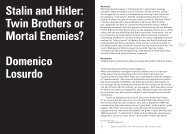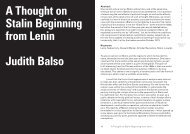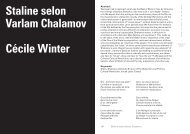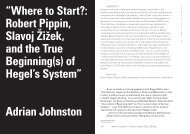Reflections on the Meaning of Stalinism Paul Le Blanc
blanc
blanc
Create successful ePaper yourself
Turn your PDF publications into a flip-book with our unique Google optimized e-Paper software.
<strong>the</strong> Communists had an interpretati<strong>on</strong> <strong>of</strong> racism as being grounded in a<br />
system, and <strong>the</strong>y were with us.” 6<br />
The fact remains, however, that Communist Party members typically<br />
came to believe – at least from <strong>the</strong> late 1920s through <strong>the</strong> mid-1950s – that<br />
Stalin and <strong>the</strong> Soviet Uni<strong>on</strong> over which he ruled were inseparable from<br />
<strong>the</strong>ir own intense struggles. And in important ways, this represented a<br />
terrible corrupti<strong>on</strong> and fatal weakness in <strong>the</strong> movement to which he and<br />
his comrades had committed <strong>the</strong>ir lives.<br />
Seeds and <strong>Meaning</strong>s<br />
A desperate struggle for survival began shortly after Russia’s 1917<br />
revoluti<strong>on</strong>ary insurgency <strong>of</strong> workers, backed by <strong>the</strong> vast peasantry, had<br />
given “all power to <strong>the</strong> soviets,” to <strong>the</strong> democratic councils <strong>of</strong> workers<br />
and peasants. The dream <strong>of</strong> workers’ democracy and liberati<strong>on</strong> <strong>of</strong> <strong>the</strong><br />
Russian masses from all oppressi<strong>on</strong> slammed into a “perfect storm” <strong>of</strong><br />
foreign invasi<strong>on</strong>s, internati<strong>on</strong>al ec<strong>on</strong>omic blockades, murderous counterrevoluti<strong>on</strong>ary<br />
armies, multiple c<strong>on</strong>spiracies and assassinati<strong>on</strong> attempts<br />
(some successful), sabotage and flight <strong>on</strong> <strong>the</strong> part <strong>of</strong> factory owners – all<br />
leading to political chaos and social collapse. <strong>Le</strong>nin and his comrades,<br />
at <strong>the</strong> helm <strong>of</strong> <strong>the</strong> new revoluti<strong>on</strong>ary regime, felt compelled to resort to<br />
an increasingly authoritarian course <strong>of</strong> acti<strong>on</strong>, as well as violent policies<br />
that could all-to-easily whirl out <strong>of</strong> c<strong>on</strong>trol, and – an overly-justified and<br />
glorified “emergency measure” – <strong>the</strong> political dictatorship by <strong>the</strong> Russian<br />
Communist Party. There were certainly seeds <strong>of</strong> <strong>Stalinism</strong> in this. 7 While<br />
hardly a Marxist or a <strong>Le</strong>ninist, Hannah Arendt c<strong>on</strong>cludes, accurately<br />
enough, that “<strong>Le</strong>nin suffered his greatest defeat when, at <strong>the</strong> outbreak <strong>of</strong><br />
<strong>the</strong> civil war, <strong>the</strong> supreme power that he originally planned to c<strong>on</strong>centrate<br />
in <strong>the</strong> Soviets definitely passed into <strong>the</strong> hands <strong>of</strong> <strong>the</strong> party bureaucracy,”<br />
but she adds – insightfully – that “even this development, tragic as it<br />
was for <strong>the</strong> course <strong>of</strong> <strong>the</strong> revoluti<strong>on</strong>, would not necessarily have led to<br />
totalitarianism.” She elaborates:<br />
At <strong>the</strong> moment <strong>of</strong> <strong>Le</strong>nin’s death [in 1924] <strong>the</strong> roads were still<br />
open. The formati<strong>on</strong> <strong>of</strong> workers, peasants, and [in <strong>the</strong> wake <strong>of</strong> <strong>the</strong> New<br />
Ec<strong>on</strong>omic Policy] middle classes need not necessarily have led to <strong>the</strong><br />
class struggle which had been characteristic <strong>of</strong> European capitalism.<br />
Agriculture could still be developed <strong>on</strong> a collective, cooperative, or<br />
private basis, and <strong>the</strong> nati<strong>on</strong>al ec<strong>on</strong>omy was still free to follow a socialist,<br />
state-capitalist, or free-enterprise pattern. N<strong>on</strong>e <strong>of</strong> <strong>the</strong>se alternatives<br />
would have automatically destroyed <strong>the</strong> new structure <strong>of</strong> <strong>the</strong> country. 8<br />
6 O’Dell 2010, p, 25.<br />
C<br />
R<br />
I<br />
S<br />
I<br />
S<br />
&<br />
C<br />
R<br />
I<br />
T<br />
I<br />
Q<br />
U<br />
E<br />
/<br />
Volume 3 /<br />
Issue 1<br />
In c<strong>on</strong>trast, some interpretati<strong>on</strong>s <strong>of</strong> <strong>Stalinism</strong> see it as simply <strong>the</strong><br />
loyal applicati<strong>on</strong> <strong>of</strong> <strong>the</strong> ideas and policies <strong>of</strong> <strong>Le</strong>nin after <strong>the</strong> Bolshevik<br />
leader’s death. It is seen as an approach dedicated to a shrewd and<br />
relentless advance <strong>of</strong> <strong>the</strong> revoluti<strong>on</strong>ary cause and particularly to <strong>the</strong><br />
up-building <strong>of</strong> <strong>the</strong> “new socialist society.” Whe<strong>the</strong>r pro-Stalinist or<br />
anti-Communist, such interpretati<strong>on</strong>s present those associated with this<br />
approach as basically “<strong>Le</strong>ninist” or “Stalinist,” <strong>the</strong> two adding up to <strong>the</strong><br />
same thing – even if Stalin was, perhaps, a bit more crude and brutal.<br />
More accurately, it seems to me, <strong>Stalinism</strong> can be seen as a form <strong>of</strong><br />
authoritarian “modernizati<strong>on</strong>,” not as a variant <strong>of</strong> socialism. A succinct<br />
definiti<strong>on</strong> <strong>of</strong> <strong>Stalinism</strong> might be: authoritarian modernizati<strong>on</strong> in <strong>the</strong> name<br />
<strong>of</strong> socialism. The democratic core <strong>of</strong> socialism – rule by <strong>the</strong> people over<br />
<strong>the</strong> ec<strong>on</strong>omy – evaporates. “Our Soviet society is a socialist society,<br />
because <strong>the</strong> private ownership <strong>of</strong> <strong>the</strong> factories, works, <strong>the</strong> land, <strong>the</strong> banks<br />
and <strong>the</strong> transport system has been abolished and public ownership put<br />
in its place,” Stalin explained to journalist Roy Howard in 1936. “The<br />
foundati<strong>on</strong> <strong>of</strong> this society is public property: state, i.e., nati<strong>on</strong>al, and<br />
also co-operative, collective farm property.” The primary purpose <strong>of</strong><br />
this would be industrial and agricultural development to advance living<br />
standards and cultural levels <strong>of</strong> <strong>the</strong> populati<strong>on</strong>, and to streng<strong>the</strong>n <strong>the</strong><br />
nati<strong>on</strong>. At <strong>the</strong> same time, he explained (for example, in his report to <strong>the</strong><br />
1930 Party C<strong>on</strong>gress), “correct leadership by <strong>the</strong> Party” is essential for<br />
such efforts: “<strong>the</strong> Party should have a correct line; … <strong>the</strong> masses should<br />
understand that <strong>the</strong> Party’s line is correct and should actively support<br />
it; … <strong>the</strong> Party should … day by day guide <strong>the</strong> carrying out <strong>of</strong> this line; …<br />
<strong>the</strong> Party should wage a determined struggle against deviati<strong>on</strong>s from <strong>the</strong><br />
general line and against c<strong>on</strong>ciliati<strong>on</strong> towards such deviati<strong>on</strong>s; … in <strong>the</strong><br />
struggle against deviati<strong>on</strong>s <strong>the</strong> Party should force <strong>the</strong> unity <strong>of</strong> its ranks<br />
and ir<strong>on</strong> discipline.” Erik van Ree has suggested that this approach was<br />
c<strong>on</strong>sistent with Stalin’s view <strong>of</strong> democracy, which he saw not as rule by<br />
<strong>the</strong> people but as “policies alleged to be in <strong>the</strong> interest <strong>of</strong> <strong>the</strong> people” and<br />
as “a system that allowed <strong>the</strong> populati<strong>on</strong> to participate at least in state<br />
organs, even without having a determining say in it.” 9<br />
Stalin’s admirer, New York Times corresp<strong>on</strong>dent Walter Duranty,<br />
captured something <strong>of</strong> this in his comment that “<strong>Stalinism</strong> was<br />
progressing from <strong>Le</strong>ninism (as <strong>Le</strong>nin had progressed from Marxism)<br />
towards a form and development all its own,” adding: “Stalin deserved<br />
his victory because he was <strong>the</strong> str<strong>on</strong>gest, and because his policies were<br />
most fitted to <strong>the</strong> Russian character and folkways in that <strong>the</strong>y established<br />
Asiatic absolutism and put <strong>the</strong> interests <strong>of</strong> Russian Socialism before<br />
C<br />
R<br />
I<br />
S<br />
I<br />
S<br />
&<br />
C<br />
R<br />
I<br />
T<br />
I<br />
Q<br />
U<br />
E<br />
/<br />
Volume 3 /<br />
Issue 1<br />
7 Serge 2015, pp. 229-418; Serge 1978; <strong>Le</strong> <strong>Blanc</strong> 2006, pp. 101-117; Rabinowitch, 2009b;<br />
Chamberlin 1987, vol. II.<br />
8 Arendt 1958, pp. 318-319.<br />
9 Stalin 1936; Stalin 1931; Van Ree 2002, pp. 3-4.<br />
86 <str<strong>on</strong>g>Reflecti<strong>on</strong>s</str<strong>on</strong>g> <strong>on</strong> <strong>the</strong> <strong>Meaning</strong> <strong>of</strong> <strong>Stalinism</strong><br />
87<br />
<str<strong>on</strong>g>Reflecti<strong>on</strong>s</str<strong>on</strong>g> <strong>on</strong> <strong>the</strong> <strong>Meaning</strong> <strong>of</strong> <strong>Stalinism</strong>






